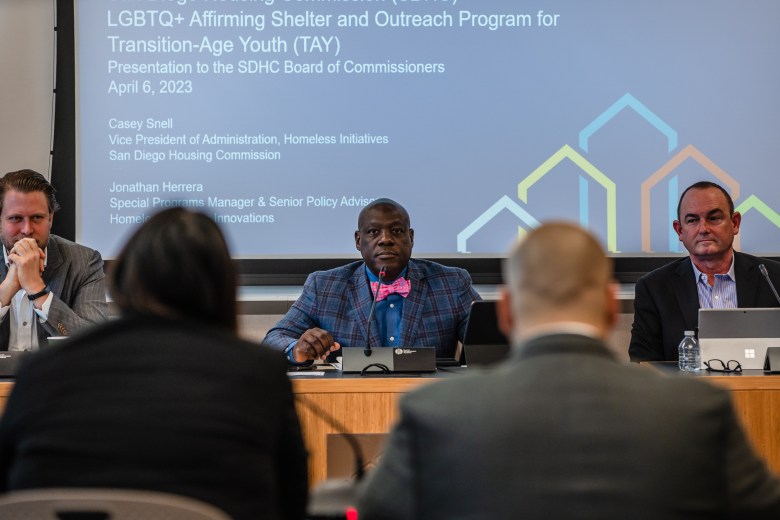Mayor Todd Gloria’s office wants the city’s Housing Commission to come up with $15 million to help plug the city’s budget deficit and minimize cuts to homeless services.
Yet Gloria’s team doesn’t know where the money’s going to come from.
Housing agency officials aren’t certain, either. They say there are strings attached to the various accounts that Gloria’s team initially thought they could tap.
The housing agency is also dealing with another blow. Gloria’s proposed budget already includes a separate 11 percent year-over-year decrease in city money for homelessness programs overseen by the Housing Commission. These cuts assume that the housing agency will chip in $15 million.
The two budget moves collectively translate into what the housing agency is reporting as a 42 percent reduction in funding for city homeless programs it oversees – and a 46 percent decrease from the city funding it wanted to address rising costs.
Among the hits to the Housing Commission budget: proposed cuts to eight shelter programs and reduced funding for a much-lauded homelessness prevention program that the Housing Commission says mean the latter initiative won’t be able to take new clients.
Gloria’s office says it had to make difficult decisions as it faced a nearly $137 million budget deficit. A drop in state grant funds for homelessness programs in the upcoming year added to the challenge.
“While we would like to fund enhanced services, the city’s limited budgetary resources necessitate tough choices,” Gloria spokesperson Rachel Laing wrote in a statement. “The mayor prioritized the maintenance of critical homelessness services when many city departments took tough budget reductions.”
Gloria’s $15 million demand and the cuts he’s calling for have left Housing Commission officials reeling.
“If SDHC is not fully funded, reductions will either eliminate programs or cut them in a way that would make them difficult to operate (reduction in staffing capacity) and/or result in a significant decrease in the number of individuals that could be served, and/or operating hours for certain programs,” Housing Commission CEO Lisa Jones wrote in a statement.
Jones said the Housing Commission’s own budget proposal incorporated cost-cutting measures the agency thought were workable.
“We believe any further cuts could have negative impacts on families SDHC serves,” Jones wrote.
During a Housing Commission budget workshop last Friday, Vice Chair Ryan Clumpner argued the cuts proposed by Gloria’s office could create staffing shortages that lead to reduced capacity in shelters. He also felt meal cutbacks Gloria’s office later described as efforts to standardize meal offerings at city shelters would be counterproductive.

Housing Commission staff said during the meeting that the Mayor’s Office didn’t ask how they’d go about reducing budgets of programs they oversee, and that bolstered meal service is needed at some shelters due to the populations they serve and their locations.
Housing agency officials said they learned of these cuts a few days before Gloria publicly unveiled his proposed budget.
Clumpner during the Housing Commission meeting urged fellow commissioners to send a letter to the City Council asking it to commit the full amount the Housing Commission wanted for homelessness programs if the city doesn’t move forward with a costly proposed shelter in Middletown. (For now, Gloria’s office said it expects to spend $21.3 million on the 1,000-bed shelter in the upcoming year, though just $2.2 million would come from the city’s day-to-day fund.)
“I wanna establish that the first and best thing that we can do in a difficult budget year is to try to protect the most critical services for the most vulnerable people,” said Clumpner, who grew more emotional as he spoke. “A 42 percent cut to those services should not be way that we close gaps.”
Clumpner’s focus on the City Council partly reflects how the Housing Commission differs from various city departments. The agency reports to the City Council while Gloria directs city departments under the city’s strong-mayor form of government.
This distinction also makes Gloria’s budget proposal more unsettling to those who are concerned about it.
Though Housing Commission staff say the mayor didn’t consult them on the proposed cuts, an April 1 email obtained by Voice of San Diego reveals Gloria’s team separately spoke with Jones about pledging $15 million to help address city budget woes. Jones told them it wouldn’t be as easy as they thought.
“As I shared during our conversation, SDHC cannot afford to commit $15 million toward city homelessness shelters and services programs,” Jones wrote in an email to Gloria and his chief of staff.
Jones also noted that Gloria’s office had mentioned “funds identified within SDHC’s investment portfolio as a basis for requesting that SDHC commit $15 million,” but that those funds were already earmarked.
Eleven days later, Gloria released a budget proposal counting on $15 million in “Housing Commission resources.”
When Voice asked Gloria’s office where it expected the housing agency to find this cash, Laing initially wrote that the mayor’s team understood that the Housing Commission had tens of millions of dollars in accounts on top of its rainy-day fund to draw from. One of those accounts was the Housing Commission’s investment fund. This is also where – among other uses – the housing agency parks money it’s agreed to dole out to affordable housing projects before developers are ready to build them.
In response to a follow-up question from Voice, Laing clarified that she had merely cited the investment fund as an example of where the Housing Commission might find cash.
The Mayor’s Office isn’t sure where the money might come from, Laing wrote, but the housing agency has been asked to find $15 million outside its operating budget to try to preserve homeless services.
“The Housing Commission is best able to determine where it might get those funds without further cuts, and they have assured us they are working to do so,” Laing wrote in an email.
She later told Voice that Gloria’s office is eager to agree on solutions.
“We’re working collaboratively to find a way to address the funding gap without cutting services,” Laing said.
Housing Commission Chair Mitch Mitchell said the agency has at least one potential option to address the city’s $15 million request – though it would require City Council approval that’s uncertain and wouldn’t cover the full amount.
Every year, the Housing Commission pitches a plan to spend fees from developers on causes including opportunities for others to seek those funds for their low-income housing projects. The agency’s draft plan for the upcoming year now includes $6 million for affordable housing projects and another $2 million on loans for casitas and aspiring homeowners.
If the City Council signs off, Mitchell said, the Housing Commission could instead direct $8 million to homelessness programs, a move that would mean the city would not provide as much funding next year to help deliver housing projects also considered crucial to addressing homelessness.
Mitchell acknowledged the challenging tradeoff. He said he’ll also urge the Housing Commission to consider its priorities and more potential cuts too.
“We want to be the best partner we can be to the mayor and the City Council but we also want to make sure that we are not leaving people out there to fend for themselves amidst this crisis so this is going to take creativity and it’s going to take capacity,” Mitchell said. “But we definitely have the commitment and there is a lot of conversation that has to occur before a final decision is made.”















